This post may contain affiliate links. Please read our disclosure policy.
Prime rib is always a treat and this Garlic and Herb Crusted Prime Rib takes a classic to the next level with the addition of herbed garlic butter, cracked black pepper, and shallots to infuse every bite with savory flavor. This is the kind of recipe you’ll be proud to serve for a big holiday get-together, but it’s simple enough that it’s just as perfect for a Sunday night dinner with your family!
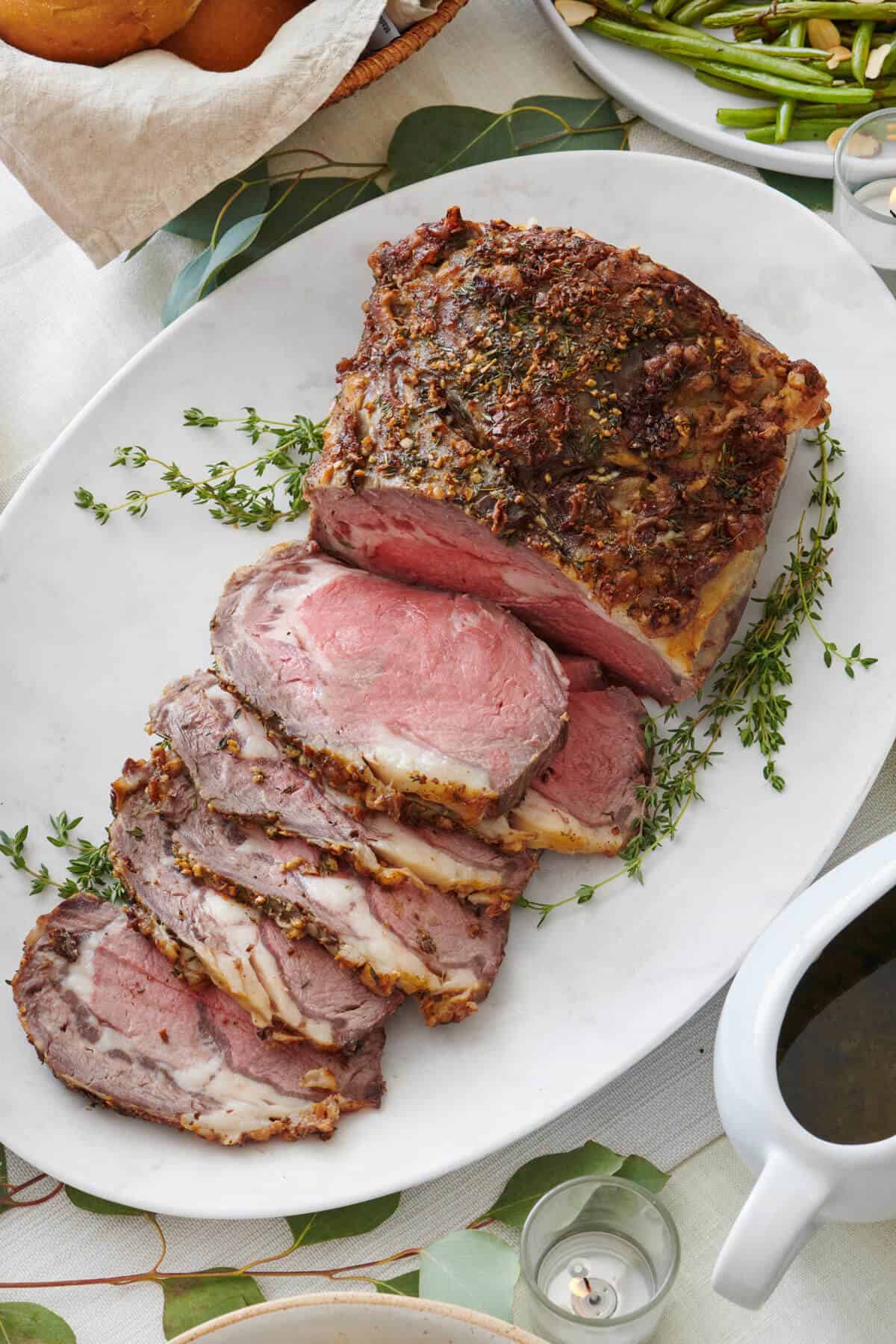
Table of Contents
- Recipe at a Glance
- Ingredients to make Prime Rib
- Popular substitutions & additions
- How to Cook Prime Rib
- Tips for making the best Herb Crusted Prime Rib
- What to serve with Herb Crusted Prime Rib
- How to store & reheat Prime Rib
- Frequently asked questions
- More entree recipes:
- Garlic and Herb Crusted Prime Rib Roast Recipe
Christmas prime rib is a tradition for many families and it’s easy to see why. This is a cut of meat that feels indulgent and worthy of a special occasion! Even without any added ingredients, the rich marbling melts as the prime rib cooks, which bastes it from the inside—the result is juicy, tender, and absolutely packed with flavor.
But add an herbed garlic butter rub and you can make a good thing even better! This herb crusted prime rib recipe adds lots of garlic (six cloves!), butter, aromatic fresh thyme leaves, and cracked black pepper to the outside of the prime rib. The garlic, herbs, and butter infuse the prime rib with flavor as it cooks, and also form a beautiful (and delicious!) crust on the outside.
This extra step adds just a few minutes to the prep time, so this is still a simple prime rib recipe that you can pull off even when you’re overwhelmed with holiday cooking. And all the oohs and ahhs from your guests as they see your herb crusted prime rib on the table will make it so worth it!
Recipe at a Glance
Cuisine Inspiration: American
Primary Cooking Method: Oven
Dietary Info: Gluten-Free, Low Carb, Keto
Key Flavor: Rich, savory, indulgent
Skill Level: Easy
Standouts
- Simple ingredients with big flavors: While the ingredient list is short, each item brings so much flavor to the table. This isn’t the kind of recipe that will have you searching high and low at the supermarket for obscure ingredients!
- Perfectly cooked every time: If you’ve never cooked a prime rib before, it can be intimidating. Don’t stress! I have you covered with simple step-by-step instructions and a fail-proof recipe that produces juicy, tender prime rib in the oven.
- The ultimate crowd-pleaser: Whether it’s for a holiday meal or a dinner party with friends, this simple prime rib recipe is sure to impress everyone, from picky kids to foodie adults.
- Leftovers are super versatile: If you’re making this for your immediate family and end up with lots of leftovers, prime rib is perfect in sandwiches and salads. This Steak Salad is ideal for using leftover prime rib!
Ingredients to make Prime Rib
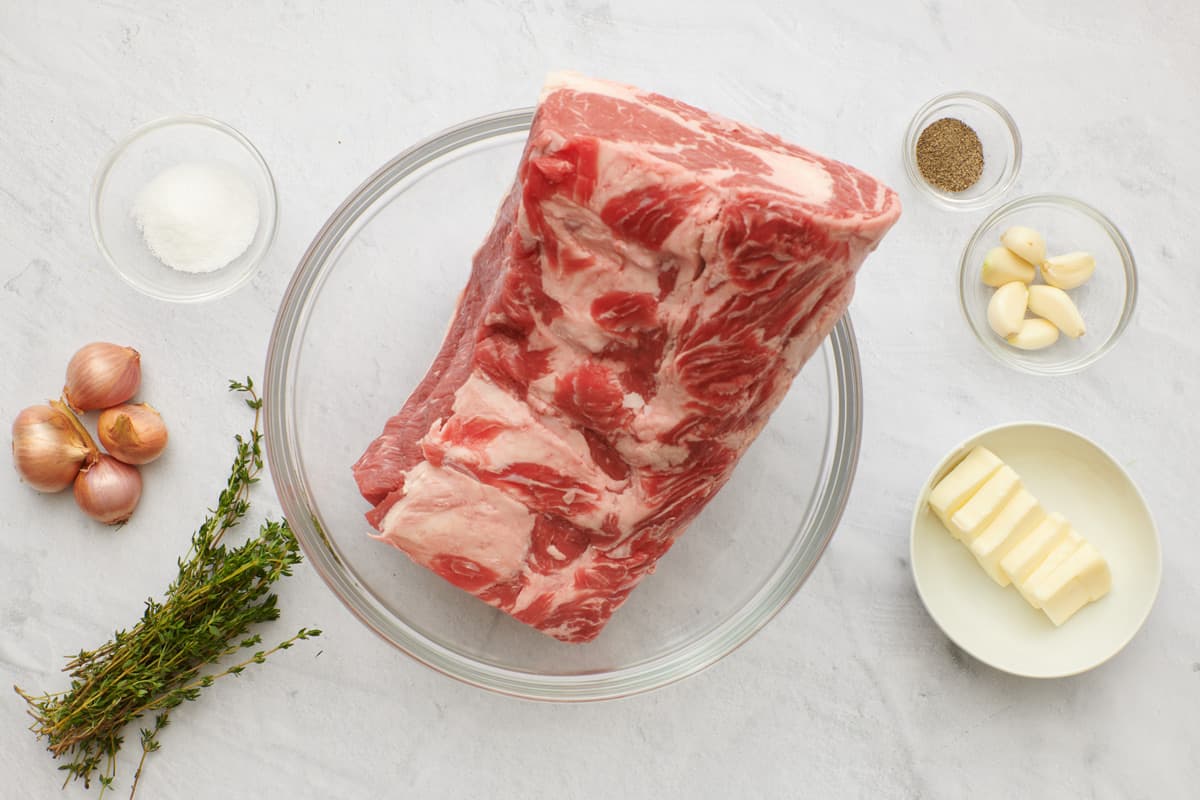
- Kosher salt: I like to use kosher salt in my cooking because it has a superior flavor to table salt.
- Boneless rib eye roast: Look for a roast that’s well-marbled. An aged roast is extra tender and flavorful!
- Unsalted butter: Let this soften at room temperature; when you gently press a finger into the butter, it should leave an indentation.
- Garlic cloves: Mince the garlic finely so it can be evenly distributed in the garlic butter.
- Fresh thyme leaves: Thyme is earthy and woodsy, which pairs well with savory prime rib.
- Black pepper: Freshly cracked black pepper is best! It’s more pungent and it creates a nice texture in the crust.
- Shallots: The shallots not only infuse the roast with flavor, but the drippings from the roast infuse the shallots with flavor too! Don’t discard them—they’re a great accompaniment to the roast.
Popular substitutions & additions
- Swap the thyme for rosemary. Rosemary also pairs beautifully with beef. Just be sure to use fresh, not dried—dried rosemary has a pine-needle-like quality to it that would make it unpleasant in the herb crust.
- Use onions instead of shallots. Yellow onions are the best substitute for shallots, but any type of onion you like or have on hand will work here.
- Try a bone-in roast. You can swap the boneless roast for bone-in. The instructions remain the same except for the cooking time; it will need longer in the oven. I always recommend judging by the temperature on an instant-read thermometer, not the time on the clock!
- Use a store-bought prime rib rub. This is a seasoning blend made specifically for prime rib! Simply mix the seasoning in with the softened butter, omitting the thyme, pepper, and garlic.
How to Cook Prime Rib
This herb crusted prime rib is easier than you think! Here’s what you’ll need to do.
Make herb butter
- Add all of the herb butter ingredients to a bowl.
- Stir everything together until all of the ingredients are evenly distributed in the butter.
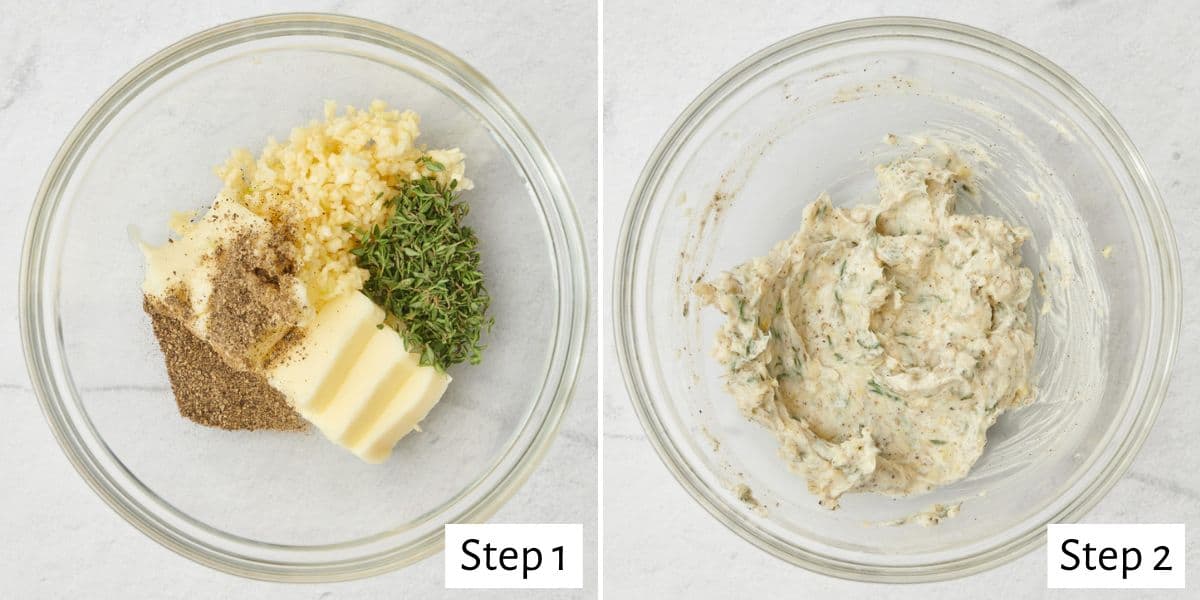
How to roast prime rib
- Set the room temperature roast into the roasting pan.
- Add shallots in an even layer at the bottom of the pan.
- Spread the herb butter all over the roast.
- Roast the prime rib in the oven until it’s medium rare, or reaches your desired level of doneness.
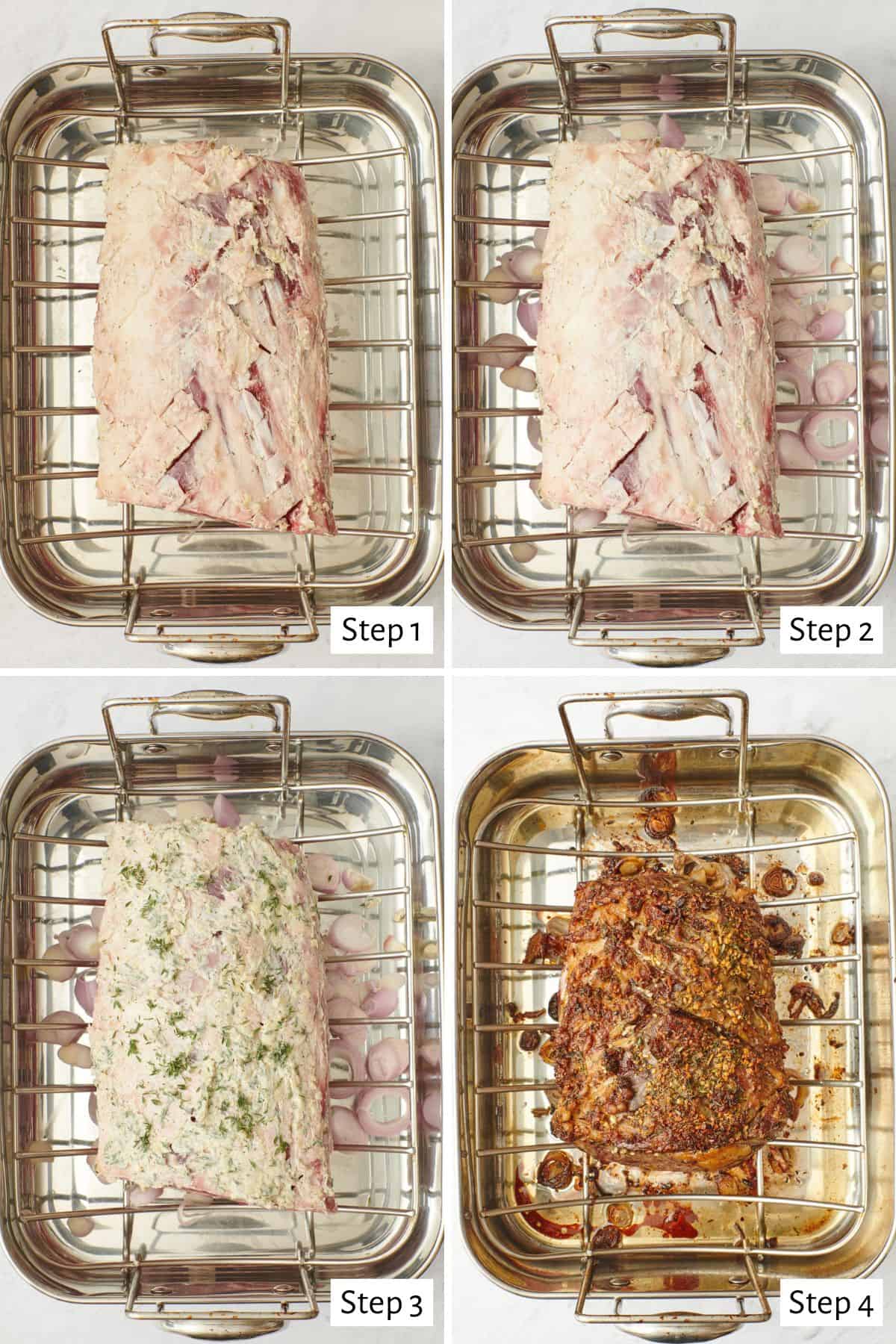
Tips for making the best Herb Crusted Prime Rib
- Plan for the time needed. Making this prime rib recipe is simple, but it does require some advance planning. You’ll need to account for the 24 hours in the fridge, plus the 90 minutes the roast needs to come to room temperature before you cook it.
- Use a meat thermometer. This is the only sure way to know when prime rib is done cooking. Visual cues are great, but a thermometer is fail-proof! For medium-rare prime rib, aim for 130°F.
- Don’t skip the resting time. Tent the prime rib with foil and let it sit for 20 minutes. This allows the juices to redistribute in the meat, so they don’t all run out and leave you with a dry roast.
- Use a carving board, not a cutting board. There’s a difference! A carving board will have a moat to catch any juices that may escape during carving. Cutting boards don’t have this feature, so you’ll be left with a mess to clean.
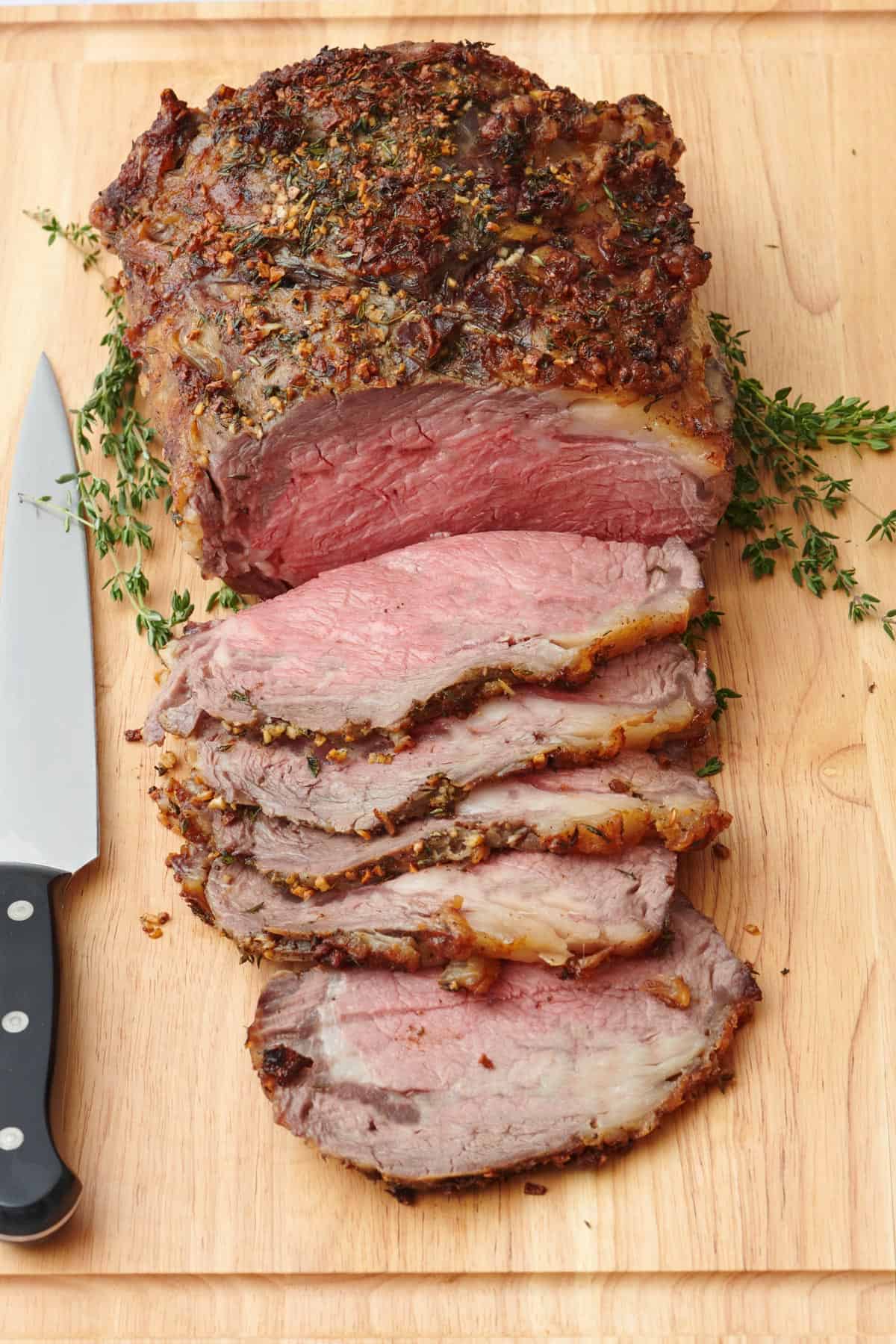
What to serve with Herb Crusted Prime Rib
- Kale Salad with Dried Cranberries
- Fondant Potatoes
- Au Jus from Prime Rib Drippings
- Green Beans with Almonds
How to store & reheat Prime Rib
Wrap leftovers in foil or transfer them to an airtight container. To reheat, place the slices on a baking sheet and cover with foil. Bake in the oven at 350°F until heated through. You can also heat individual slices in the microwave for about 30 seconds.
How long will Prime Rib last in the fridge?
Leftover prime rib will last for 3 to 4 days in the refrigerator.
Can i freeze Herb Crusted Prime Rib?
Yes, you can freeze this prime rib. Once cooled, place it in a freezer-safe bag or airtight container. It will keep for up to 3 months in the freezer. To thaw, simply place it in the refrigerator overnight, then reheat according to the instructions above.
Frequently asked questions
What should I do if the roast is cooking too fast or too slow?
Cooking times can vary due to several factors like the exact size of your roast, how long it was out of the fridge before cooking, or the true temperature of your oven. If your roast is cooking faster than you expected, you can lower the oven temperature by about 25°F and check the internal temperature frequently to prevent overcooking. On the other hand, if it’s cooking slower than anticipated, you can slightly increase the oven temperature. Always use an instant-read thermometer to closely monitor the internal temperature to make sure you get the perfect doneness.
My roast has hit the ideal internal temperature, but I’m not ready to serve it yet. What should I do?
Once your prime rib roast hits the target internal temperature, remove it from the oven and tent it loosely with aluminum foil. This will help keep it warm while also allowing it to rest, which lets the juices redistribute within the meat. The roast’s internal temperature will continue to rise a few degrees during this period, so taking it out of the oven a little early can be beneficial. Resting under foil can extend your serving time by up to an hour without significantly affecting the texture or temperature of the meat.
What temperature should prime rib be served at?
The ideal serving temperature for prime rib depends on your preferred level of doneness. For medium-rare, aim for an internal temperature of about 130-135°F. This range provides a tender, juicy, and flavorful prime rib. If you prefer medium, target an internal temperature of 135-140°F. For those who like it well-done, aim for an internal temperature above 145°F. Keep in mind that the roast’s internal temperature will continue to rise a few degrees after you remove it from the oven, so you may want to take it out a few degrees before it reaches your preferred temperature. Always use an instant-read thermometer for the most accurate results.
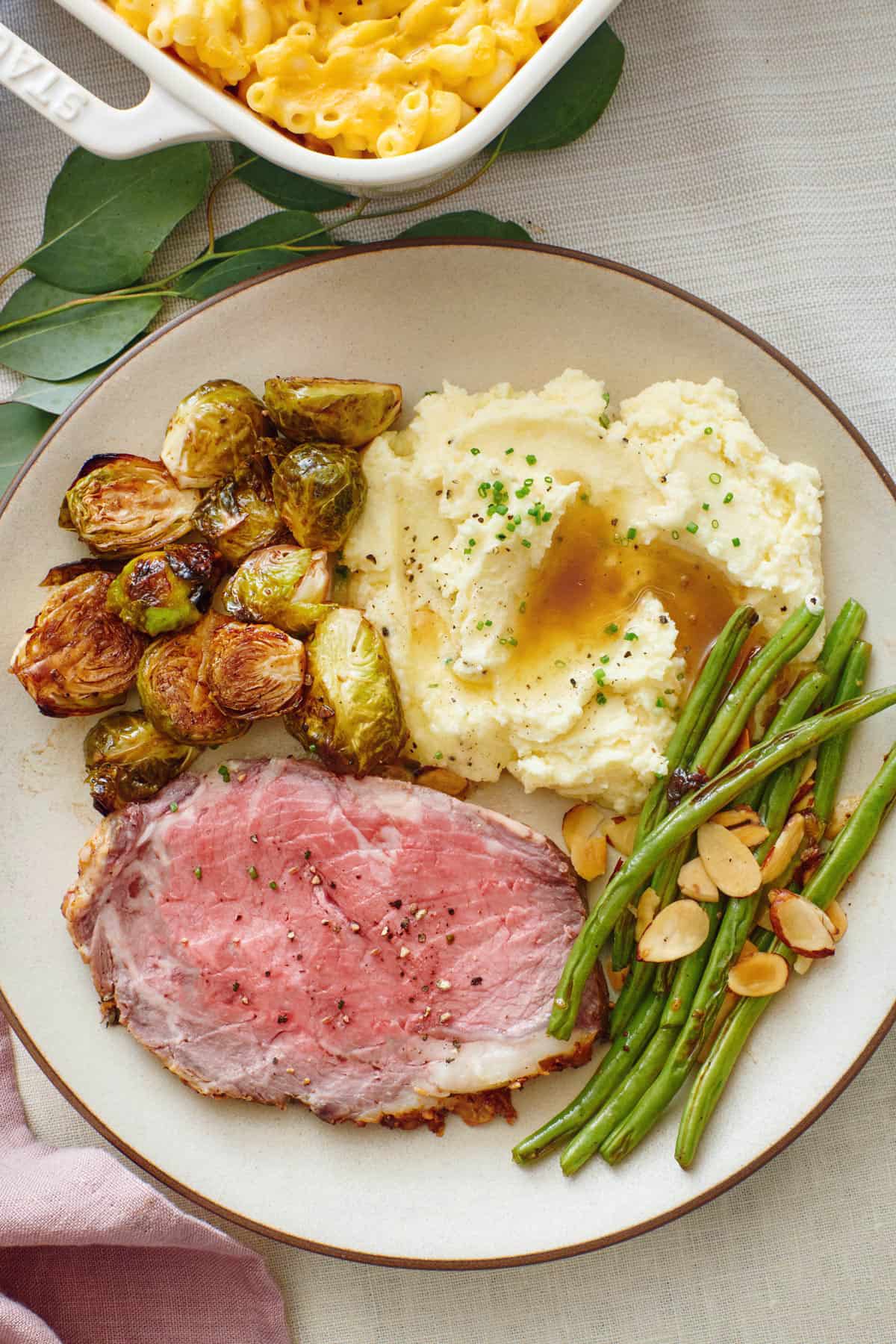
For a truly show-stopping main dish, you can’t do better than this garlic and herb crusted prime rib recipe. Once you know how to cook prime rib, you’ll want to make it for every holiday and special occasion!
More entree recipes:
- Steak Salad
- Grilled Lamb Chops
- Honey Mustard Salmon
- Baked Za’atar Chicken Legs
- Garlic Butter Steak Tips
- Rosemary Roasted Whole Chicken
- Cast Iron Skillet Steak
If you try this feel good Prime Rib recipe or any other recipe on Feel Good Foodie, then don’t forget to rate the recipe and leave a comment below! It helps others who are thinking of making the recipe. We would love to hear about your experience making it. And if you snapped some shots, share it on Instagram so we can repost on Stories!
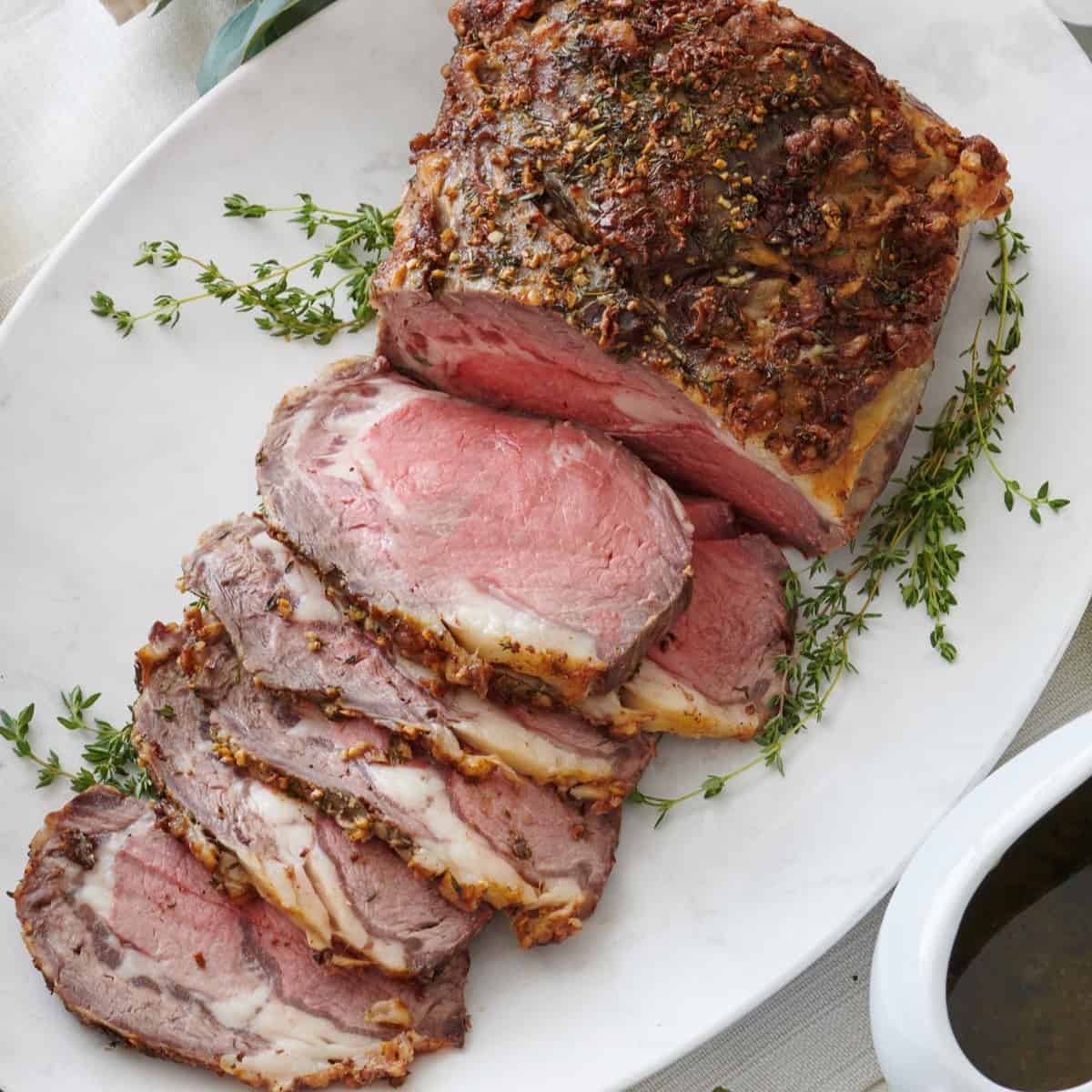
Garlic and Herb Crusted Prime Rib Roast
Ingredients
- 1 tablespoon kosher salt
- 1 6 to 7 pound boneless rib eye roast
- 6 tablespoons unsalted butter softened
- 6 garlic cloves minced
- 2 tablespoons fresh thyme leaves
- 1 teaspoon black pepper
- 4 shallots cut into thick slices
Instructions
- If your roast has a thick layer of fat (fat cap) on top, use a very sharp chef’s knife to carefully crosshatch the fat. Liberally season the roast all over with kosher salt, then place on a roasting pan or rimmed sheet pan and set in the fridge uncovered for 24 hours. This will allow the salt to penetrate the meat for maximum flavor.
- About 3 ½ to 4 hours before you would like to eat, remove the meat from the fridge and let it sit at room temperature for about 90 minutes.
- While the roast sits, mix the softened butter, garlic, thyme and pepper together. You want the butter mixture to be solid but easily spreadable.
- Preheat the oven to 500˚F with the baking rack set in the middle of the oven. Set the shallots in an even layer in a roasting pan. Set the roast on top and rub the butter mixture all over.
- Roast at 500˚F for about 15 minutes, or until the fat begins to render and brown. Reduce the heat to 325˚F and continue to roast for 14 to 16 minutes per pound, or until the internal temperature of the very center of the roast reaches 130˚F on an instant read thermometer for medium rare.
- Remove the roast from the oven and place on a carving board (you want something that will collect the juices) and tent with foil. Rest for at least 20 minutes before carving.
Notes
Nutrition
Nutrition information provided is an estimate. It will vary based on cooking method and specific ingredients used.






Quick question. Do you set your oven on “roast” or “bake”? Thank you!
Bake is fine for this application!
Made it last night. It was excellent. Just that my rib eye weighed 3.28pounds ie it was supposed to be in the oven for 48 mins excluding the first 15mins (500F), but it was just at 90F…so I had to cook it for another 30mins to reach 135F. What did I do wrong? My rib eye was not in the fridge for 2 hours.
Hmm, so you started with the meat at room temperature? Any chance it was frozen before cooking?
I bought it fresh, not frozen and yes, I took the meat out 2.5hours before cooking it. no worries. I am just curious…